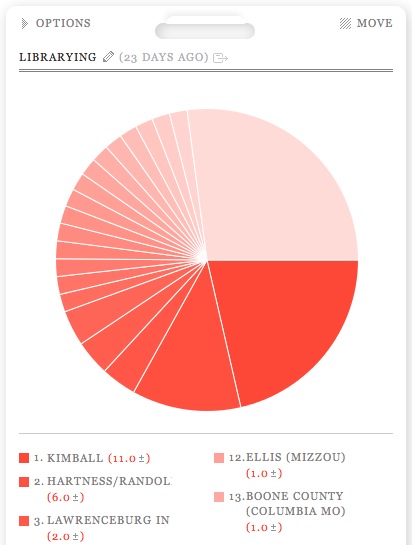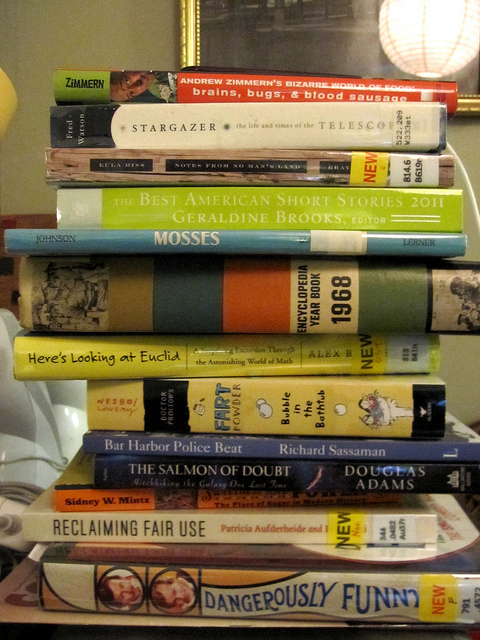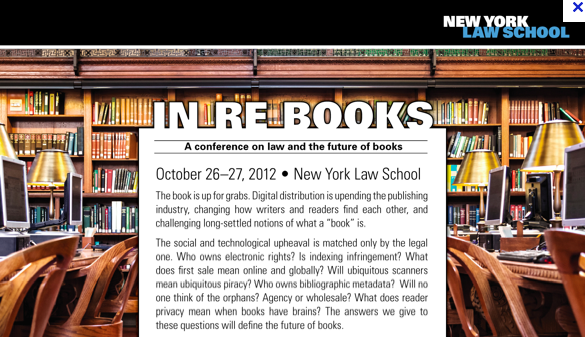
We get it. Times are tough. The public sphere is shrinking in the US and elsewhere. Libraries are around and open, doing stuff. Their funding cycle is cyclical and short and up to the whims of various people, sometimes mysterious. The public library system belongs to everyone. There is a lot to talk about; a lot of things happen there. Many people have strong opinions about how public spaces are used and public money is spent and about the library in specific. You have a 24 hour news cycle, with pages or screens to fill. That’s terrific. We’re often happy for the attention.
At the same time, there are a few tropes that do none of us any favors. You look like people who haven’t done your research or who go for the easy cliche and we look like people who can’t take a well-meaning joke (which we’ve heard for the thousandth time). Let’s get to a place where we’re all feeling good about the whole endeavor. Here are some suggestions. Hope this list, patterned off of How Not To Write Comics Criticism, is helpful. It’s called
How Not To Write About Libraries
1. Your library joke is tired, even if it’s new to you
It is almost impossible for you to make a library play on words that has not been done a million times before, even something that sounds contemporary like riffing off of “adult graphic novels”. You’re probably annoyed that you got the job writing about the library funding crisis but don’t take it out on us. Notify the headline writer also, please. We know you’re doing your best but we should never see “turns the page” or “starts a new chapter” when a new building is built or a librarian gets a new job, retires, or dies, or any sort of bun/shush/dewey/cat pun again ever. That “Overdue book returned years late” story? Heard it. Thank you.
2. Quit it with the wardrobe policing
You try working nights and weekends in a landmark building with a heating and cooling system that dates back to Carnegie times. Dressing in wool and layers is practical and smart, as is keeping your hair out of your face when you might have to crawl under a desk to fuss with a computer. Sixty-four percent of Americans wear eyeglasses, that number jumps to 90% after age 49. We’re not absurdly myopic from all that reading, we’re normal. Saying “OMG they can be sexy too!” is not actually a good response to this; as professions go we’ve always been pretty anti-censorship and sex positive.
3. We’re not all women, not even close
In 2008 the gender split among new grads was 80% female, 20% male. Last year it was more like 78% to 22% and the female/male gap is shrinking. We come from many ethnic backgrounds and we speak many languages. We date and marry people of many genders. A good number of us are just out of library school and share the characteristics of other people in our cohort: tattoos, body jewelry, a penchant for cocktails. Many of us are not just out of library school and enjoy the same things. Nothing unusual. Diversity of all kinds is important in any sort of public service position when you work for the entire public; please try to respect and represent the diversity of our population as it exists in the actual world not as it existed in the movies thirty or even fifty years ago.
4. Many different people work in a library building
This frequently comes up when there is a crime or another scandal at a library and someone gets interviewed who is invariably called “a librarian” and is later revealed to be a page, a volunteer, or maybe just an interested and chatty patron. Librarians (usually) work in libraries, but not everyone who works in a library is a librarian. There are many schools of thought on the importance of these distinctions and while we don’t expect you understand the subtle nuances of the differences between a reference librarian and a cataloger, or a circulation clerk and a shelver, it’s simply important to know that there are many different jobs within the library and not all of them are “librarian” and if you are not sure what the job title is of the person you spoke with, you should ask them. Many professional librarians, though not all, have Master’s degrees from accredited institutions. People call this level of graduate education “library school” and graduates have degrees ranging from MLib. (mine) to MSIS to MLS to MLIS.
5. There are some amazing things hidden in special collections
…and your chances of getting to see them diminish if you continually represent library archives as dusty, musty, smelly, unkempt, or populated entirely with hobbits and wizard-beings, strange and unknowable creatures unschooled in human customs. Introduce yourself and spend some time there and you’re likely to see some amazing things and learn some nifty things about your location, your neighbors or your academic institution.
6. No one with any credibility thinks “It’s all on the internet” and there are reasons why it isn’t
This is an untrue straw man argument, so you don’t have to keep bringing it up. There is a strong case to be made that the push for increasing digitization will be a net good for a society that is increasingly looking to satisfy their information needs online. However we are far from that point now, the digital divide is real and formidable. The vendor-based silos of information which are inaccessible without a payment or a password vex us as much as, if not more than, they vex you. We are trying to help people access the information they want and need. We’re sorry that the shift to digital content is causing trouble for some businesses’ bottom line, but we’ve always been publishers’ best customers and that will change only if they force it to. We would prefer that digital rights management were less onerous too. We would be happy to talk with you at length about why it’s easier to buy something from Amazon.com for personal use than it is to borrow it from the library on your Kindle. Blame copyright and capitalism, not the library.
7. The money thing is complicated, take some time to understand it
Libraries are funded differently from state to state and sometimes from county to county. Reporting on a funding “crisis” when it’s just a possible budget adjustment does us all a disservice with the “sky is falling” approach. Giving people real information about what is happening with and to the budget, and why, would be a great service. More information less doomsaying please. And, as always, if you need the numbers we’ll be happy to give them to you. They’re public. Public libraries have regular meetings of the library board that are open to the public and worth attending if this sort of thing piques your interest.
8. Not all libraries are public libraries
I work in a public library and so I fall into this trap myself. The public library system in the US is a sort of amazing decentralized mutual aid sort of creation, but it’s not the only library system in the US. School libraries and academic (college and university) libraries and law libraries and medical/hospital libraries and other special libraries all have their own systems and procedures and governing bylaws and mission statements and professional associations. Make sure that you are not reporting on one and ascribing it the values and traditions of another entirely different type of library.

9. The entire public is welcome in the public library
…including types of people you may dislike or find distasteful. And possibly including people who find you distasteful. With few exceptions people who are spending entire days or weeks in the library or who are looking at things on their computer screen that people might feel they should be viewing in private are doing so because they lack better or more genuine options. This is a larger societal problem and we are trying to help, making the best of a difficult situation within the structure of our mission statement and policies and procedures. The situation is complicated and deserves a better treatment than the usual “Porn in the library!” headline-grabbers.
10. Libraries are full of joyful noise
Not always, but often enough to say goodbye to the tut-tutting and the shushing and the QUIET PLEASE canards. While we try to have spaces that can accommodate quiet reading as well as rambunctious storytimes and group projects, libraries’ approaches to this are as varied as our buildings. Libraries are more popular than ever by most measures of library popularity and are still tremendously well-loved cultural institutions that are available to and for every single person. The reports of our demise have been greatly exaggerated, especially on the internet.
However it is true that most of us like cats and mostly do not hate Wikipedia.
Here are some more pointers to places to get good, factual information about libraries in the US.
– ALA’s Library Bill of Rights
– ALA Library LibGuides
– ALA’s research and statistics section including the Library ROI bibliography
– IMLS (Institute of Museum and Library Services) reports
– ALA’s State of American Libraries report
– Library Journal’s Placement and Salaries Survey
Now translated into Portuguese!
All images come from the Library of Congress’s Prints & Photographs Online Catalog and have no known restrictions on publication. Article specifically inspired by this tweet. Thanks to Andy Woodworth for reading the draft. Made a few small edits in response to recent feedback.





